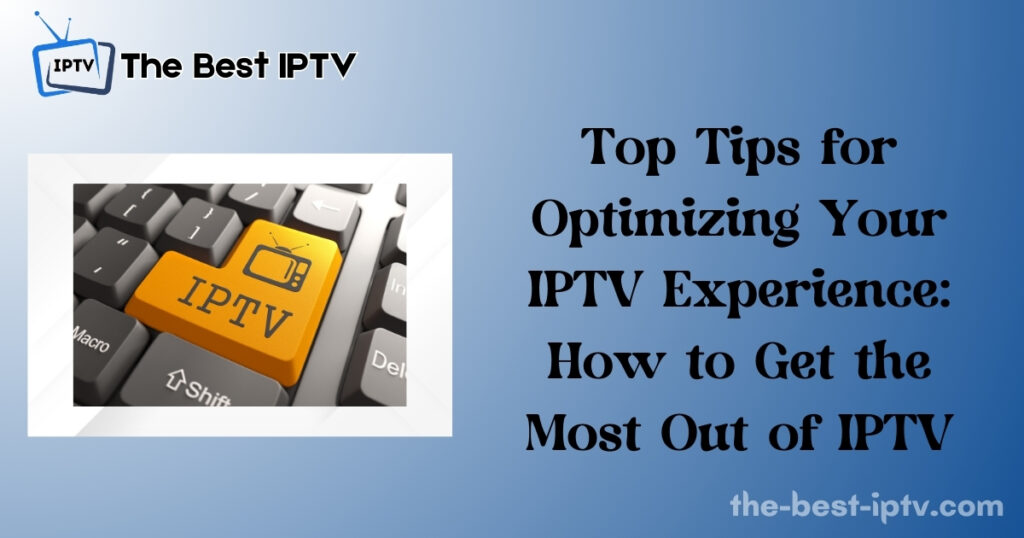In today’s digital age, IPTV (Internet Protocol Television) is revolutionizing the way we consume television content.
By delivering media through the internet rather than traditional cable or satellite systems, IPTV offers a versatile, customizable, and on-demand TV experience.
However, just subscribing to an IPTV service isn’t enough to ensure a seamless viewing experience. You need to optimize your setup and know the ins and outs of how IPTV works to truly enjoy what it has to offer.
In this guide, we’ll walk you through Top Tips for Optimizing Your IPTV Experience: How to Get the Most Out of IPTV. Whether you’re new to IPTV or a seasoned user, these insights will help you maximize streaming quality, minimize interruptions, and customize the service to your liking.
1. Choosing the Right IPTV Provider
The foundation of a great IPTV experience begins with selecting the right provider. With countless options available, it’s important to research thoroughly before making a decision.
Researching Providers
Start by looking for IPTV providers with a solid reputation for reliability, customer service, and content offerings. Reviews from current users are an excellent source of real-world feedback. Keep an eye out for features such as HD streaming options, an extensive channel lineup, and available customer support.
Understanding Channel Lineup and Pricing
Different IPTV providers offer varied channel packages and pricing models. Some may focus on specific regions or genres, while others provide comprehensive global access. Compare pricing based on the channels, movie libraries, and sports packages that interest you most. Make sure you’re getting value for money while ensuring the content lineup fits your needs.
2. Internet Speed Requirements
Minimum Internet Speeds for IPTV
IPTV is data-intensive, so having a stable and fast internet connection is critical for smooth streaming. Typically, for HD quality, you’ll need a minimum of 5-10 Mbps, while 4K streaming may require speeds upwards of 25 Mbps.
Testing Your Internet Speed
It’s essential to regularly test your internet speed using online tools like Speedtest.net. If your speed is below what your IPTV service requires, consider upgrading your plan or contacting your ISP (Internet Service Provider) to resolve any issues. Having an unstable or slow connection is one of the primary reasons IPTV users experience buffering or lag.
3. Network Hardware Optimization
Importance of a Good Router
Your router plays a significant role in your IPTV experience. If you’re using an outdated or low-quality router, it can bottleneck your internet speed, leading to lag and buffering during streaming.
Wi-Fi vs. Ethernet Connection
Although Wi-Fi is convenient, an Ethernet connection is generally more stable and faster, especially for IPTV streaming. Whenever possible, use an Ethernet cable directly connected to your router to ensure you’re getting the best possible speed without interference from other wireless devices.
4. IPTV Buffering and Lag Solutions
Identifying the Cause of Buffering
Buffering is one of the most frustrating issues IPTV users face. The causes can range from slow internet speeds, overloaded servers on the IPTV provider’s end, or even outdated apps and devices.
Solutions for Reducing Buffering
To mitigate buffering, consider using a VPN to reduce network congestion, updating your IPTV app regularly, or switching servers if your IPTV provider offers multiple server locations. It’s also helpful to close unnecessary apps running in the background that may be using up bandwidth.
5. Best IPTV Apps and Devices
Popular IPTV Apps
Several IPTV apps provide excellent interfaces and features for users. Popular apps like Kodi, Perfect Player, and Tivimate offer smooth navigation, customizable options, and user-friendly experiences.
Devices Compatible with IPTV
IPTV is highly versatile, working on various devices, including Smart TVs, Android TV boxes, Amazon Fire Stick, and even gaming consoles. For the best experience, choose devices that support HD and 4K streaming capabilities.
6. Customizing Your IPTV Interface
Personalizing Channels
One of the best things about IPTV is the ability to personalize your channel lineup. Many apps allow you to add or remove channels based on your preferences, letting you create a streamlined experience.
Custom Guide Options
Customizing your electronic program guide (EPG) can greatly enhance the way you navigate through channels. Set up favorites, organize your guide, and choose layouts that are easy to browse.
7. Using VPN for IPTV
Why Use a VPN?
A VPN (Virtual Private Network) can provide privacy and security while using IPTV. It also helps bypass regional content restrictions, giving you access to channels and services that might be blocked in your area.
Best VPN Services for IPTV
When selecting a VPN for IPTV, look for services that offer fast speeds, unlimited bandwidth, and reliable server networks. NordVPN, ExpressVPN, and CyberGhost are among the best options for IPTV users.
8. Recording and Catch-Up Features
How to Record IPTV Content
Many IPTV services offer the ability to record live TV. You can set up recordings for your favorite shows and watch them at your convenience. Ensure your IPTV Services app or device has enough storage to handle recordings.
Utilizing Catch-Up TV Features
Catch-up TV allows you to watch shows that have aired within the last 24-72 hours. This feature is great for users who miss live broadcasts but still want to watch their favorite programs without setting up recordings.
9. Parental Controls and Family-Friendly Settings
Setting Up Parental Controls
IPTV offers customizable parental controls to restrict access to certain channels or content. This ensures a safe viewing experience for younger family members.
Managing Multi-User Profiles
Some IPTV services allow the creation of multiple user profiles, making it easier for each family member to access their preferred content and settings without affecting the overall interface.
10. Enhancing IPTV Streaming Quality
Adjusting Streaming Settings
Tweaking streaming settings within your IPTV app can improve performance. Lowering the resolution or adjusting buffering settings may help if you experience lag or interruptions.
Reducing Latency
Latency can make IPTV feel sluggish. To reduce latency, try optimizing your internet connection, using a wired Ethernet setup, or connecting to a closer VPN server.
FAQs
How much internet speed is required for IPTV?
For standard definition (SD), 3-5 Mbps is generally sufficient. For high-definition (HD), aim for at least 10 Mbps, and for 4K streaming, a minimum of 25 Mbps is recommended.
Can I use IPTV with a slow connection?
Yes, but your experience might be impacted. You may need to lower the streaming quality or consider a provider that offers lower bandwidth options.
What devices are compatible with IPTV?
IPTV is compatible with Smart TVs, Android TV boxes, Amazon Fire Stick, smartphones, tablets, and gaming consoles.
Is IPTV legal to use?
IPTV itself is legal, but it’s essential to ensure you’re using legitimate services that hold broadcasting rights for their content.
How can I improve my IPTV experience?
Improve your IPTV experience by optimizing your internet connection, using a good VPN, selecting the right device, and customizing your app settings.
Do I need a VPN to use IPTV?
While not mandatory, using a VPN can enhance your privacy, security, and access to geo-restricted content.



